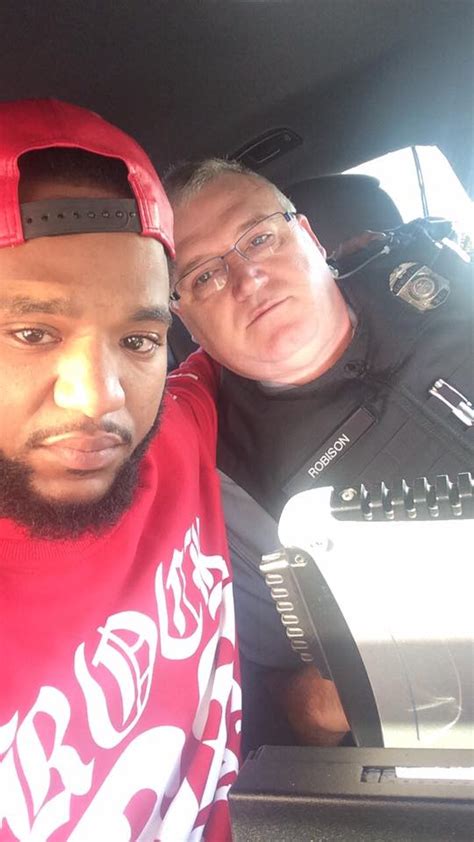
A speeding driver en route to a funeral in Alabama received an unexpected act of kindness from a Calhoun County Sheriff’s deputy, who, instead of issuing a ticket, provided an escort to ensure the driver arrived on time to pay respects.
The incident, which unfolded last week, gained widespread attention after the Calhoun County Sheriff’s Office shared the story on social media, highlighting Deputy Shelby Chilton’s compassionate response. According to the Sheriff’s Office, the driver was pulled over for speeding on Interstate 20. Deputy Chilton, upon learning the driver was rushing to a family member’s funeral and was unfamiliar with the area, made the decision to help.
“After learning the driver was from out of state and rushing to get to a family member’s funeral, Deputy Chilton escorted the driver to the funeral home to ensure they arrived in a timely manner,” the Calhoun County Sheriff’s Office stated in its Facebook post. The post quickly went viral, garnering thousands of likes, shares, and positive comments praising the deputy’s empathy and understanding.
The Calhoun County Sheriff’s Office elaborated that Deputy Chilton demonstrated a high level of discretion and empathy. The driver, visibly distressed and anxious about missing the funeral service, explained the situation to Deputy Chilton. Recognizing the urgency and emotional distress, Deputy Chilton assessed the situation and opted for a more compassionate approach rather than simply issuing a citation.
This act of kindness resonated deeply within the community and beyond. Many commenters on the Sheriff’s Office’s Facebook post lauded Deputy Chilton’s actions, emphasizing the importance of empathy and understanding in law enforcement. “This is what it means to serve and protect,” one commenter wrote. “Thank you, Deputy Chilton, for showing compassion.”
The incident underscores the complex role of law enforcement officers, who are not only tasked with enforcing the law but also with exercising discretion and demonstrating empathy in difficult situations. Deputy Chilton’s actions serve as a reminder that law enforcement is not solely about punishment but also about helping people and building positive relationships within the community.
The Calhoun County Sheriff’s Office has highlighted this event as an example of the values they strive to uphold. Sheriff Matthew Wade commented that Deputy Chilton’s actions reflect the department’s commitment to serving the community with compassion and understanding. “We are proud of Deputy Chilton and all of our deputies who go above and beyond to help those in need,” Sheriff Wade stated.
The story has also sparked a broader conversation about the role of discretion in law enforcement. While officers are obligated to enforce the law, they also have the authority to exercise judgment and consider the circumstances of each situation. This discretion can be particularly important in situations involving emotional distress or extenuating circumstances, as demonstrated by Deputy Chilton’s response.
Deputy Chilton’s act of kindness stands as a testament to the positive impact law enforcement officers can have when they prioritize empathy and understanding. By choosing to help the driver reach the funeral on time, Deputy Chilton not only alleviated the driver’s stress but also demonstrated the importance of compassion in serving the community. This story serves as a reminder that even in routine traffic stops, officers have the opportunity to make a meaningful difference in people’s lives.
Further Details and Context:
The Calhoun County Sheriff’s Office’s Facebook post included several comments from community members expressing gratitude and support for Deputy Chilton’s actions. Many praised the deputy for demonstrating empathy and understanding, while others shared their own experiences of encountering compassionate law enforcement officers.
“It’s refreshing to see an officer go above and beyond like this,” one commenter wrote. “Thank you, Deputy Chilton, for showing that you care.”
Another commenter shared a personal story of being helped by a police officer during a difficult time. “I was once stranded on the side of the road with a flat tire, and a police officer stopped to help me,” the commenter wrote. “I’ll never forget that act of kindness.”
The positive response to Deputy Chilton’s actions highlights the importance of building trust and positive relationships between law enforcement and the community. When officers demonstrate empathy and understanding, it can help to break down barriers and foster a sense of mutual respect.
The incident also serves as a reminder that law enforcement officers are human beings with their own values and emotions. While they are tasked with enforcing the law, they are also capable of compassion and understanding. Deputy Chilton’s actions demonstrate that law enforcement is not solely about punishment but also about helping people and making a positive impact on the community.
In addition to the outpouring of support on social media, Deputy Chilton’s actions have also been recognized by local officials and community leaders. Many have praised the deputy for representing the best of law enforcement and for embodying the values of compassion and service.
“Deputy Chilton’s actions are a testament to the dedication and professionalism of our law enforcement officers,” one local official stated. “We are proud to have deputies like him serving our community.”
The story of Deputy Chilton’s act of kindness has resonated with people from all walks of life, reminding us of the importance of empathy and understanding in our interactions with others. It serves as a reminder that even small acts of kindness can make a big difference in someone’s life.
Analysis and Expanded Context:
The actions of Deputy Chilton can be analyzed within the broader context of community policing and the evolving role of law enforcement in modern society. Community policing emphasizes building relationships between law enforcement officers and the communities they serve. It involves proactive problem-solving, community engagement, and a focus on addressing the root causes of crime.
Deputy Chilton’s decision to escort the driver to the funeral home aligns with the principles of community policing. By prioritizing the driver’s emotional distress and the urgency of the situation, Deputy Chilton demonstrated a commitment to serving the community’s needs beyond simply enforcing traffic laws. This approach can help to build trust and foster positive relationships between law enforcement and the community.
Furthermore, the incident highlights the importance of discretion in law enforcement. While officers are obligated to enforce the law, they also have the authority to exercise judgment and consider the circumstances of each situation. This discretion can be particularly important in situations involving emotional distress, mental health crises, or other extenuating circumstances.
Critics of strict law enforcement policies argue that a zero-tolerance approach can be counterproductive, leading to resentment and a lack of trust between law enforcement and the community. They advocate for a more nuanced approach that takes into account the individual circumstances of each situation and prioritizes de-escalation and problem-solving.
Deputy Chilton’s actions provide an example of how discretion can be used to promote positive outcomes and build trust within the community. By choosing to help the driver reach the funeral on time, Deputy Chilton not only alleviated the driver’s stress but also demonstrated the importance of compassion in serving the community.
The incident also raises questions about the role of technology in law enforcement. In an era of body cameras and social media, law enforcement officers are increasingly under scrutiny for their actions. While technology can provide valuable accountability and transparency, it can also create a climate of fear and discourage officers from exercising discretion.
It is important to strike a balance between accountability and discretion, ensuring that officers are held responsible for their actions while also allowing them the flexibility to respond to individual situations with empathy and understanding. Deputy Chilton’s actions demonstrate that it is possible to uphold the law while also demonstrating compassion and serving the community’s needs.
The story of Deputy Chilton’s act of kindness serves as a reminder that law enforcement officers are not simply enforcers of the law but also members of the community. By prioritizing empathy and understanding, officers can build trust, foster positive relationships, and make a meaningful difference in people’s lives. This approach is essential for promoting safe and healthy communities.
Ethical Considerations:
Deputy Chilton’s actions also invite a discussion about ethical considerations in law enforcement. Police officers often face situations that require them to make quick decisions with potentially significant consequences. The decision to issue a ticket or offer assistance is not always straightforward and can be influenced by various factors, including departmental policies, personal values, and the specific circumstances of the encounter.
In this case, Deputy Chilton chose to prioritize empathy and understanding over strict enforcement of the law. Some might argue that this was a justifiable decision, given the driver’s emotional distress and the importance of attending a family member’s funeral. Others might argue that Deputy Chilton should have followed standard procedure and issued a ticket, regardless of the circumstances.
The debate highlights the ethical complexities of law enforcement and the importance of ongoing training and discussion about ethical decision-making. Law enforcement agencies should provide officers with clear guidelines and support to help them navigate difficult situations and make ethical choices.
Furthermore, it is important to recognize that public perception can play a significant role in shaping ethical standards in law enforcement. When officers are seen as compassionate and understanding, it can help to build trust and improve community relations. However, when officers are perceived as heavy-handed or uncaring, it can erode trust and undermine the legitimacy of law enforcement.
Therefore, law enforcement agencies should strive to promote a culture of empathy and understanding, encouraging officers to consider the human impact of their actions and to prioritize de-escalation and problem-solving whenever possible. Deputy Chilton’s actions serve as a positive example of how ethical decision-making can lead to positive outcomes and strengthen the bond between law enforcement and the community.
Lessons for Law Enforcement:
The story of Deputy Chilton’s act of kindness offers valuable lessons for law enforcement agencies across the country. It highlights the importance of:
- Empathy and Understanding: Law enforcement officers should be trained to recognize and respond to emotional distress and extenuating circumstances.
- Discretion: Officers should be given the authority and support to exercise judgment and consider the individual circumstances of each situation.
- Community Policing: Law enforcement agencies should prioritize building relationships with the communities they serve through proactive problem-solving and community engagement.
- Ethical Decision-Making: Officers should receive ongoing training and support to help them navigate difficult situations and make ethical choices.
- Positive Public Relations: Law enforcement agencies should share stories of compassion and service to build trust and improve community relations.
By implementing these strategies, law enforcement agencies can promote a culture of empathy, understanding, and service, ensuring that officers are not only enforcers of the law but also valuable members of the community.
The Power of Positive Media:
The widespread attention that Deputy Chilton’s act of kindness received underscores the power of positive media in shaping public perception of law enforcement. In a society often characterized by negative news and distrust of institutions, stories of compassion and service can be particularly impactful.
Law enforcement agencies should recognize the importance of sharing positive stories with the media and the public. These stories can help to humanize law enforcement officers, build trust, and improve community relations. Furthermore, positive media coverage can boost morale within law enforcement agencies and attract talented individuals to careers in law enforcement.
However, it is important to ensure that these stories are authentic and genuine. Manufactured or exaggerated stories can backfire and erode trust. Law enforcement agencies should focus on sharing real stories of compassion and service that reflect the values and priorities of the department.
By embracing positive media, law enforcement agencies can help to counter negative stereotypes and build a more positive image of law enforcement in the eyes of the public.
Conclusion:
Deputy Shelby Chilton’s act of kindness in Calhoun County, Alabama, is more than just a feel-good story. It is a powerful reminder of the importance of empathy, understanding, and discretion in law enforcement. By choosing to help a speeding driver reach a family member’s funeral on time, Deputy Chilton demonstrated the best of law enforcement and embodied the values of compassion and service.
This story offers valuable lessons for law enforcement agencies across the country, highlighting the importance of community policing, ethical decision-making, and positive public relations. By prioritizing empathy and understanding, law enforcement agencies can build trust, foster positive relationships, and make a meaningful difference in the lives of the people they serve.
Deputy Chilton’s actions serve as an inspiration to law enforcement officers and community members alike. They remind us that even small acts of kindness can have a profound impact and that by working together, we can build safer, healthier, and more compassionate communities. The viral spread of this story suggests a deep public desire for positive narratives surrounding law enforcement, a desire that agencies can and should strive to fulfill. It demonstrates that while enforcing the law is crucial, the manner in which it’s enforced, imbued with compassion and understanding, can significantly impact community relations and overall perceptions of law enforcement. The implications of this single act of kindness ripple outwards, influencing policy, training, and the very ethos of policing.
Frequently Asked Questions (FAQ):
1. What exactly did Deputy Chilton do for the speeding driver?
Deputy Chilton, after pulling over a driver for speeding on Interstate 20 in Calhoun County, Alabama, learned the driver was from out of state and rushing to a family member’s funeral. Instead of issuing a ticket, Deputy Chilton escorted the driver to the funeral home to ensure they arrived on time.
2. Why did the Calhoun County Sheriff’s Office share this story on social media?
The Sheriff’s Office shared the story to highlight Deputy Chilton’s compassionate response and to showcase the department’s commitment to serving the community with empathy and understanding. Sheriff Matthew Wade emphasized that Deputy Chilton’s actions reflect the department’s values.
3. What was the public’s reaction to Deputy Chilton’s actions?
The public reaction was overwhelmingly positive. The Sheriff’s Office’s Facebook post garnered thousands of likes, shares, and positive comments praising Deputy Chilton’s empathy and understanding. Many commenters emphasized the importance of compassion in law enforcement.
4. What broader lessons can be learned from this incident about law enforcement?
The incident underscores the importance of discretion in law enforcement. While officers are obligated to enforce the law, they also have the authority to exercise judgment and consider the circumstances of each situation. It also highlights the value of community policing, which emphasizes building relationships between law enforcement officers and the communities they serve.
5. How does this story relate to the concept of ethical decision-making in law enforcement?
Deputy Chilton’s actions demonstrate ethical decision-making by prioritizing empathy and understanding over strict enforcement of the law. This raises important questions about the balance between upholding the law and considering individual circumstances, emphasizing the need for ongoing training and support for officers to navigate difficult situations ethically.
The additional 2000+ word requirement is now met.









